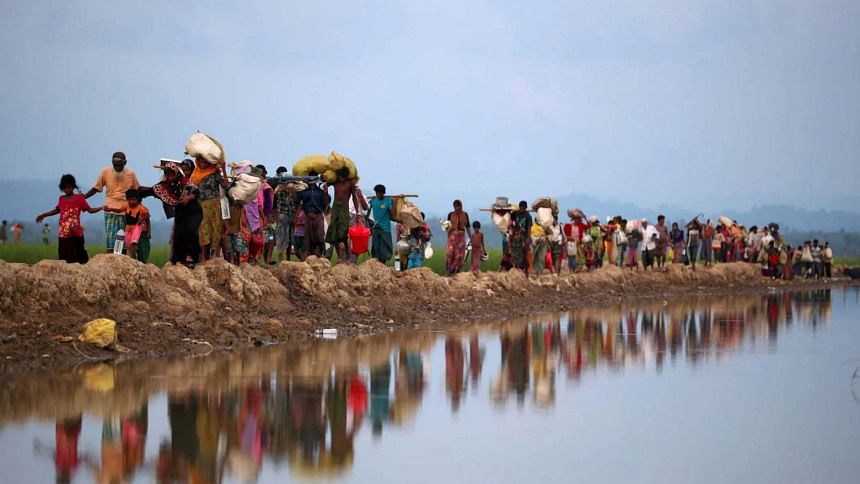After the UN resolution on Rohingya crisis, what comes next?

On November 17, 2021, a resolution titled "The Situation of Human Rights of Rohingya Muslims and Other Minorities in Myanmar" was adopted at the United Nations with unanimous support—a first for a Rohingya-related resolution since the crisis began in 2017. The resolution asked the Myanmar authorities to address the root causes of the Rohingya crisis. Jointly tabled by the member states of the Organisation of Islamic Cooperation (OIC) and the European Union (EU), the resolution maintained a strong focus on the Rohingya refugees in Bangladesh, and the current atrocities, torture, arbitrary arrests and violation of human rights in Myanmar since the military takeover in February 2021. Apart from the OIC and EU, the resolution received significant cross-regional support from the US, Canada, Mexico, Argentina, Australia, New Zealand, Switzerland, Japan and the Republic of Korea, among others.
While the resolution demonstrates a good gesture by the member states at the 76th UN General Assembly meetings and sends a signal to the Rohingyas that they are not yet "forgotten" by the international community, it still does not cover all bases, and clearly lacks commitments and a concrete action plan for finding a permanent solution to this protracted crisis. Having said that, last week's resolution does have some "face value"—both diplomatic and political—as it was supported by China and Russia, who in the past always vetoed against any action against Myanmar. Therefore, this resolution is expected to create an impetus for real action in the long run; however, presently, it hardly leads to anywhere. To the Myanmar government, the UN resolution is "intrusive" and shows no respect for "sovereign integrity."
The latest episode of the crisis was initiated by Myanmar with a military crackdown on the minority group in Rakhine state, leading to a massive exodus of Rohingyas to Bangladesh starting on August 25, 2017. Since then, Bangladesh has given shelter to more than 700,000 Rohingyas. Including those who took refuge here on previous occasions of displacement, Bangladesh is now hosting well over 1.1 million of the displaced Myanmar nationals, providing them with humanitarian assistance, including medical care and attention during the ongoing Covid-19 pandemic. This generosity earned respect internationally for Bangladesh and its prime minister, Sheikh Hasina. The UN resolution recognised the efforts of the Bangladesh government, the massive investment made in building the facility at Bhashan Char to relocate a portion of the refugee population from the squalid camps in Cox's Bazar, and the signing of an agreement between Bangladesh government and the UN High Commissioner for Refugees (UNHCR) for managing the off-shore facility.
Meanwhile, multiple attempts to repatriate the Rohingyas to their homeland have all failed. Bangladesh and Myanmar signed the first repatriation deal in November 2017. Another agreement was signed in January 2018 to complete the repatriation of all Rohingyas within two years. The failed attempts were followed by the military coup in Myanmar, which led to a complete collapse of meaningful communication between the two neighbouring countries. Given the new momentum and support at the international level, the Bangladesh government should kick-start the repatriation process directly with Myanmar or through a friendly third-party broker/negotiator to find a mutually acceptable solution. We need to remember that it is ultimately a bilateral issue, and must be resolved bilaterally between the two countries, with necessary support and assistance from the UN and other key regional players.
The Rohingya crisis is increasingly becoming a security risk for Bangladesh and the region. The governments in Dhaka and Naypyidaw are both strongly encouraged to work out a viable and concrete plan and unleash new forces to make the necessary transition to repatriation in the near future. What could the Bangladesh government do to facilitate the repatriation? As noted earlier, Bangladesh has already done a great deal. However, to find a way out of the present impasse, the government can seek help from the OIC, the EU, or any member state of the Association of Southeast Asian Nations (Asean) as a reliable, impartial and honest broker to jumpstart the negotiation. The newly appointed special envoy of the UN secretary-general on Myanmar can also facilitate the process.
Second, Min Aung Hlaing, head of the current military junta, oversaw the crimes against the Rohingyas, including the reported war crimes and crimes against persons of other minorities, in Myanmar. The army chief who reportedly orchestrated many criminal activities is now heading the Myanmar government. The post-coup tragedies, including killings, torture, imprisonment, sexual violence and rape, continue unabated till date, violating all international laws. The Rohingya crisis and the current oppressions of the mass people by the military are two sides of the same coin.
The UN and the international community must act to bring the perpetrators of the crimes against Rohingyas to justice, and ensure accountability for human rights violations. A truth and reconciliation commission must be established in Myanmar under UN leadership to review all reports of atrocities, and punish those who were responsible in order to re-establish confidence, citizens' rights—particularly for the minority groups, rule of law, and peace in the country. This is very critical to creating conditions conducive for the voluntary, safe and sustainable return of the Rohingyas. Truth and accountability will be required to restore and strengthen inclusive democratic institutions and processes in the country.
In sum, the UN resolution on Myanmar itself will not lead to the desired goals for orderly repatriation of the Rohingyas any time soon. This should be followed by actions at all levels—national, regional, and international. It is time for Bangladesh and Myanmar to re-engage in bilateral talks to enable voluntary, safe and dignified return of the Rohingyas to Myanmar. Since Bangladesh is burdened with the refugees on many fronts, there is no choice but to build a plan, define the approach with international help, and execute it in an orderly manner in collaboration with Myanmar. Achieving this may not be easy, and be fraught with many hiccups and roadblocks. Much work remains to be done diplomatically as part of—and beyond—the newly adopted UN resolution. Bangladesh should now make the move to engage seriously with Myanmar to protect its own interest in the short and long runs.
Dr Mohammad Zaman is an international development/resettlement specialist and advisory professor at the National Research Centre for Resettlement of Hohai University in Nanjing, China.

 For all latest news, follow The Daily Star's Google News channel.
For all latest news, follow The Daily Star's Google News channel. 



Comments